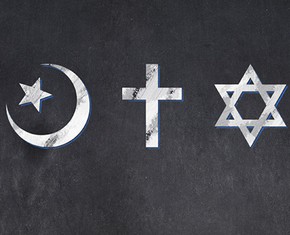The views expressed in our content reflect individual perspectives and do not represent the authoritative views of the Baha'i Faith.
Baha’is believe in Christ—and the Baha’i writings confirm many teachings found in the Bible.
For example, on the issue of rebirth we find that:
… man must be born again. As the babe is born into the light of this physical world, so must the physical and intellectual man be born into the light of the world of Divinity. – Abdu’l-Baha, The Promulgation of Universal Peace, p. 288.
Regarding baptism, Abdu’l-Baha said:
Man cannot free himself from the onslaught of vain and selfish desires save through the confirming grace of the Holy Spirit. That is why it is said that baptism must be with the spirit, with water, and with fire—that is, with the spirit of divine grace, the water of knowledge and life, and the fire of the love of God. It is with this spirit, this water, and this fire that man must be baptized, that he may partake of everlasting grace. – Abdu’l-Baha, Some Answered Questions, newly revised edition, p. 104.
Baha’u’llah, however, did not agree with the church doctrine of original sin. On the contrary, he taught that human beings are noble creations. At the moment they come into existence they are pure and free from sin. However, they are dependent on God’s mercy and grace for their progress. Baha’u’llah affirmed the principle of grace in this way:
The tie … between the creature and the Creator, should in itself be regarded as a token of His gracious favor unto men, and not as an indication of any merit they may possess. – Gleanings from the Writings of Baha’u’llah, pp. 193-194.
He also emphasized the need for repentance: “… return ye to God and repent, that He, through His grace, may have mercy upon you, may wash away your sins, and forgive your trespasses.” – Ibid., p. 130.
A related concept is that of justification by faith. In the beginning of the Most Holy Book, Baha’u’llah wrote that it is man’s duty to believe in and obey the manifestation of God. Whoever fails to do so has gone astray, “though he be the author of every righteous deed.” – p. 19. This makes clear that good works alone do not suffice. Although good works are important, to be acceptable they must be motivated by a spirit of true faith.
Baha’u’llah also affirmed the concept of salvation:
Blessed is the man that hath acknowledged his belief in God and in His signs, and recognized that “He shall not be asked of His doings.”
… Such is the teaching which God bestoweth on you, a teaching that will deliver you from all manner of doubt and perplexity, and enable you to attain unto salvation both in this world and in the next. – Gleanings from the Writings of Baha’u’llah, pp. 86, 87.
But at times some people, in their “doubt and perplexity,” feel that the messengers of God must prove themselves to humanity. They ask the prophets to perform miracles.
Miracles
People often expect prophets to perform miracles, and some contemporaries even requested them to do so. Although Christ performed many miracles, he never did so when asked by the Pharisees and others whose intent was not sincere. He realized that such acts are not always appreciated even by those who witness them, as the incident of the ten lepers suggests. The Pharisees ascribed Christ’s miracles to satanic forces. He even warned his followers that miracles in and of themselves do not constitute decisive proof of prophethood.
Many miracles have been attributed to the Bab and to Baha’u’llah—but Baha’u’llah was disinclined to mention them. He explained that the real miracle is the transformation of human hearts, which is something only God can accomplish. On one occasion, Baha’u’llah did agree to produce a miracle for a group of clergy. But this offer was never fulfilled because those who requested it would not agree to his one condition—their advance, written pledge to acknowledge the truth of the Babi Faith if the miracle were successfully accomplished.
The Manifestations of God are sources of miraculous deeds and marvellous signs. Any difficult or impossible matter is to Them possible and permitted. For They show forth extraordinary feats through an extraordinary power, and They influence the world of nature through a power that transcends nature. From each one of Them, marvellous things have appeared.
But in the Sacred Scriptures a special terminology is used, and in the sight of the Manifestations of God these marvels and miracles are of no importance, so much so that They do not even wish them to be mentioned. For even if these miracles were considered the greatest of proofs, they would constitute a clear evidence only for those who were present when they took place, not for those who were absent. – Abdu’l-Baha, Some Answered Questions, newly revised edition, p. 113.
















Comments
Sign in or create an account
Continue with Googleor